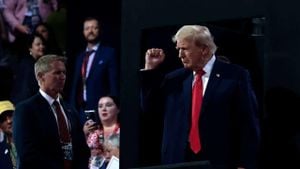President-elect Donald Trump has stirred up controversy by nominating Robert F. Kennedy Jr. as the new Secretary of Health and Human Services (HHS). This appointment, revealed publicly on Thursday, marks a significant shift not only for the Trump administration but potentially for the United States' public health policies as well.
Kennedy, the son of the late Senator Robert F. Kennedy, had previously bid for the presidency himself. After initially running as a Democrat, he switched to an independent campaign before suspending his presidential aspirations this August. Shortly afterward, he dangled his support for Trump, effectively trading his independent bid for a chance to help shape health policy at the highest levels.
“I am thrilled to announce Robert F. Kennedy Jr. as The United States Secretary of Health and Human Services (HHS),” Trump proclaimed. “For too long, Americans have been crushed by the industrial food complex and drug companies who have engaged in deception, misinformation, and disinformation when itcomes to Public Health.”
While Kennedy's appointment may come with promises of reform, it also instills trepidation among public health experts and various government officials. The role he is stepping this role oversees key agencies, including the Food and Drug Administration (FDA) and the Centers for Disease Control and Prevention (CDC), both of which play pivotal roles during health crises.
Dr. Richard Besser, who once led the CDC, expressed his deep concerns, stating, “Naming Robert F. Kennedy Jr. as Secretary of Health and Human Services is absolutely chilling and could have severe consequences for the health of people in America.”
On his social media platform, Trump shared his vision for HHS under Kennedy, declaring it would protect Americans from harmful chemicals and pollutants. Trump emphasized, “Mr. Kennedy will restore these Agencies to the traditions of Gold Standard Scientific Research and beacons of Transparency to end the Chronic Disease epidemic.”
Yet, Kennedy's history raises red flags. He is known widely as one of the leading advocates against vaccinations, often perpetuating ideas deemed as misinformation. During his previous presidential campaign, particularly on the issue of childhood vaccines, he sparked debates by linking certain vaccines to autism, claims unsupported by evidence and widely discredited by health experts.
Throughout the pandemic, his skepticism extended to the COVID-19 vaccines, where he was critiqued for allegedly sowing distrust against mainstream public health efforts. His organization, Children’s Health Defense, has recorded numerous instances of promoting false claims, raising alarms about the potential influence he could wield if confirmed.
Kennedy has also made statements about the government's involvement with various aspects of public health, such as calling for the removal of fluoride from water systems. His advocacy against fluoride—which has received broad support from health organizations for its role in preventing tooth decay—has drawn pushback, particularly from those who've touted its benefits since public water systems began this practice more than seven decades ago.
“Kennedy is a science-denying, morally-bankrupt conspiracy theorist who will endanger people’s lives if placed in a position of authority over health,” lamented Lisa Gilbert, co-president of the consumer advocacy group Public Citizen. Gilbert’s comments encapsulate the mounting apprehension surrounding Kennedy's potential leadership over HHS.
Trump's administration appears to be doubling down on solutions suggested by Kennedy during recent campaign rallies, which focused on promoting health alternatives over pharmaceuticals. His “Make America Healthy Again” campaign reflects this ethos and has maintained audiences by emphasizing chronic health issues affecting many Americans, coupled with calls for transparency and scientific integrity.
Despite all the buzz, Kennedy commands support among certain circles. Proponents assert his approach provides much-needed scrutiny on what they see as excessive pharmaceutical influence over health policies. Advocates like Marty Irby, president of Competitive Markets Action, praised Trump’s decision, asserting it could lead to fundamental changes benefiting American public health.
Nevertheless, as Trump prepares to reenter the White House, critics caution against the speed with which appointments are made, particularly underlining the need for qualified candidates who are trained and experienced experts rather than individuals operating on theories or discredit scientific consensus.
Many are bracing for potential shifts heading forward, and the gravity of Kennedy's confirmation hangs heavily over discussions about public health and safety across the country. The Senate will now have the chance to weigh these concerns against Kennedy's diverse platform and experience.
All eyes are currently on the Senate, as confirmation hearings loom, and the debates over Kennedy's fitness for the position of HHS Secretary are bound to stir up not only political but also public health discussions across the nation.



